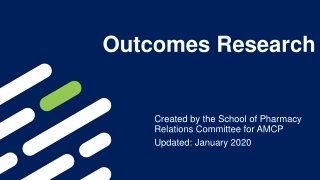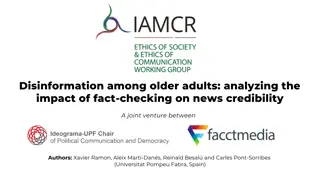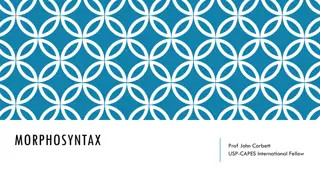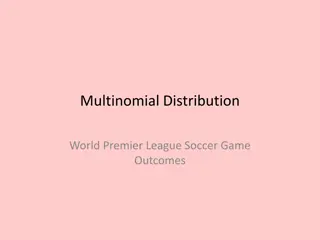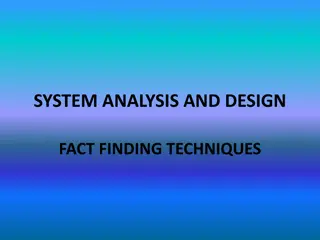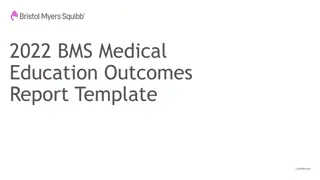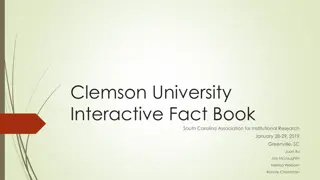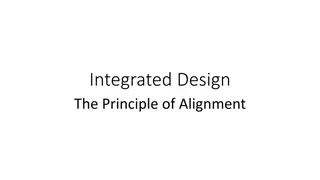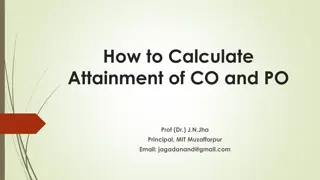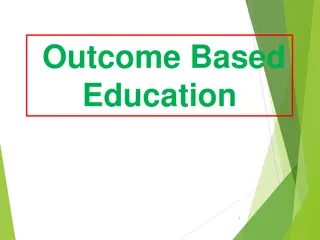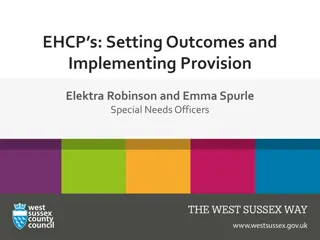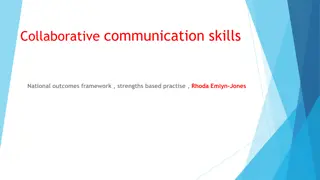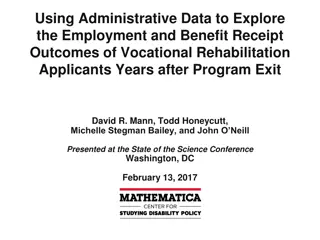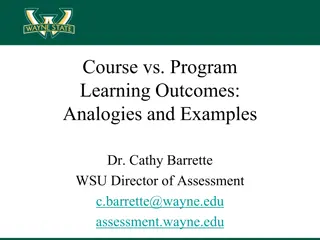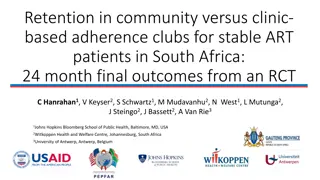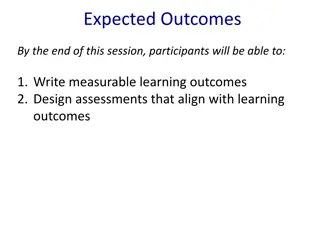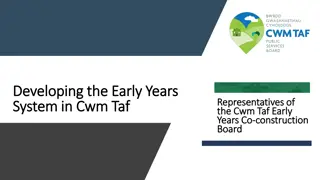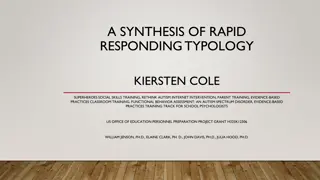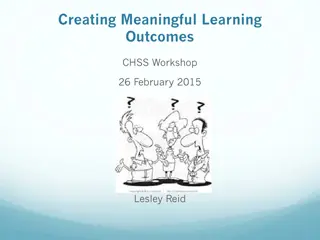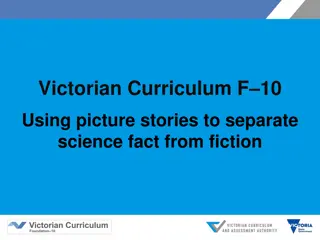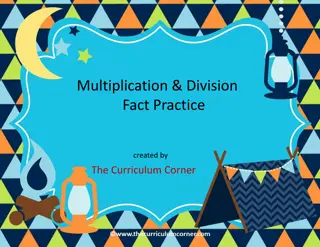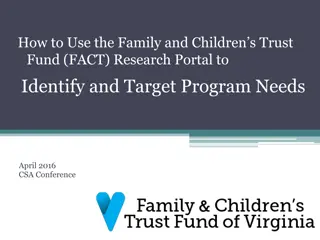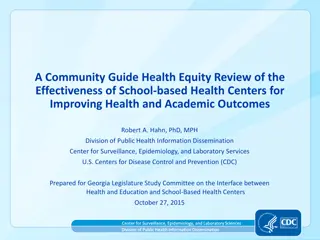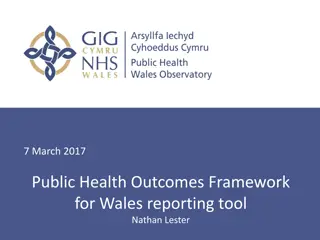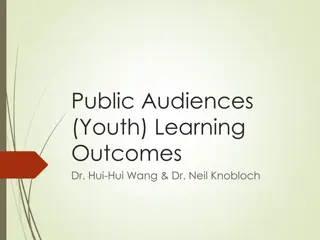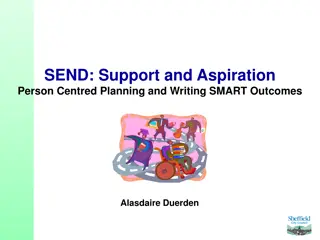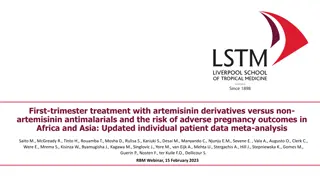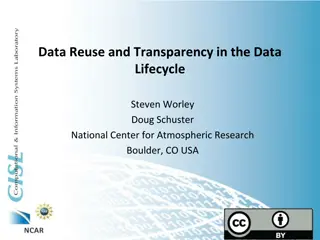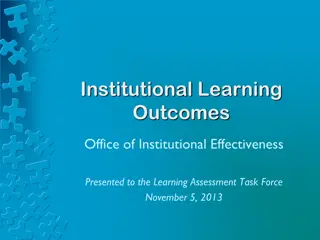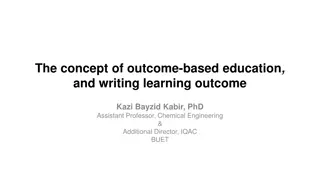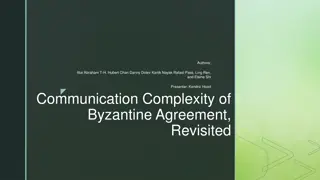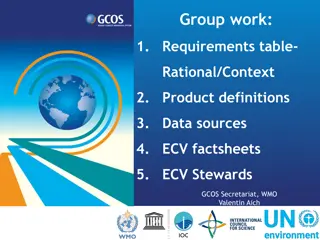Outcomes Research
Explore the definition and importance of outcomes research in managed care, including the tools used to measure clinical, economic, and humanistic outcomes. Discover the role of managed care pharmacists in outcomes research.
3 views • 20 slides
Prioritizing Clinically Important Outcomes Using Hierarchical Win Ratio
Clinical trials often use composite outcomes, but conventional analysis methods have limitations in accurately reflecting clinical reality. Hierarchical outcomes offer flexibility by defining a hierarchy of events based on importance. Analyzing trials using hierarchical outcomes involves comparing p
7 views • 20 slides
Understanding Outcome-Based Education (OBE) and Quality Improvement Framework
Outcome-Based Education (OBE) focuses on what students should achieve, captured in Program Outcomes (POs) and Course Outcomes (COs). The process involves curriculum design, teaching methods, assessment of attainment, and continuous quality improvement. Quality in education is defined by clearly stat
5 views • 115 slides
Impact of Fact-Checking on Credibility Among Older Adults
Analyzing the impact of fact-checking on news credibility among older adults reveals that age is a key factor in information credibility. Older adults tend to give more credibility to various kinds of information, leading to potential challenges in discerning between true facts and false news. Fact-
5 views • 31 slides
Understanding Mood and Modality in Morphosyntax with Prof. John Corbett
Today's session with Prof. John Corbett explores the final three sets of grammatical categories related to verbs: mood (fact or non-fact), modality (speaker's stance), and voice (subject's role). The session delves into the present-day English mood system, differentiating between various realization
1 views • 24 slides
Understanding the Distinction Between Findings of Fact and Conclusions of Law
The distinction between findings of fact and conclusions of law is explored through various legal opinions and cases. The complexity and importance of this distinction are highlighted, with instances where findings are deemed as conclusions and vice versa. Scholars and legal experts have pondered ov
0 views • 24 slides
Understanding Multinomial Distribution in Statistical Analysis
Multinomial Distribution is a powerful tool used in statistical analysis to model outcomes of events with multiple categories. This distribution is applied to scenarios where each trial has several possible outcomes, and the sum of probabilities of all outcomes is equal to 1. By defining random vari
0 views • 8 slides
Understanding Fact Finding Techniques in System Analysis and Design
Fact finding techniques play a crucial role in collecting essential data and information for system analysis and design. Techniques include sampling existing documentation, research, observation, questionnaires, interviews, prototyping, and joint requirements planning. Extracting facts accurately is
1 views • 8 slides
Exploring Addition and Subtraction Fact Families Warm-Up
Engage in a series of activities to discover and practice addition and subtraction fact families. These exercises will help strengthen numerical skills and foster a deeper understanding of mathematical operations. Dive into the world of numbers and boost your math proficiency through interactive lea
1 views • 7 slides
Texas CASA Volunteer Training Chapter 8: Moving Forward as an Advocate
Chapter 8 of the Texas CASA Volunteer Training focuses on moving forward as an advocate, covering pre-work recap, policies, working a case, training review, and looking ahead. Participants engage in activities related to the Redd Case, court report writing, and volunteer competencies. The chapter em
0 views • 22 slides
Comprehensive Medical Education Outcomes Report
This confidential report template outlines key instructions for creating and submitting outcomes reports in the field of medical education. It includes guidelines, slide templates, and specific data requirements for interim and final outcomes findings. The provided information must be accurately inp
0 views • 18 slides
Enhancing Data Analysis for Clemson University's Fact Book
Exploring the implementation of Tableau Server for presenting Clemson University's Interactive Fact Book, including considerations for data accuracy, design consistency, and improved navigation. The report covers insights on data preparation, retention, graduation, and the importance of communicatio
0 views • 13 slides
Principles of Integrated Design and Alignment in Course Development
Explore the significance of alignment in course and assessment design, program development factors, defining learning outcomes, designing assessments, and the interconnection between outcomes, tasks, feedback, and grading. Understand how integrated design shapes teaching and learning processes suppo
0 views • 23 slides
Understanding Course Outcomes and Program Attainment in Engineering Education
Graduates of engineering programs in India are required to attain Program Outcomes (POs) identified by the National Board of Accreditation (NBA) through courses, projects, and activities. Course Outcomes (COs) define what students should be able to do at the end of a course and play a crucial role i
0 views • 63 slides
Understanding Outcome-Based Education in Engineering Programs
Outcome-Based Education (OBE) focuses on assessing student learning outcomes and program effectiveness in fields like engineering. It aims to produce graduates who meet industry needs, exhibit proficiency in applied knowledge, and demonstrate essential skills and ethical values. OBE involves definin
0 views • 30 slides
Understanding EHCP Outcomes and Provision for Special Educational Needs
EHCP outcomes and provision for special educational needs are crucial components outlined in a child or young person's Education, Health, and Care Plan (EHCP). Long-term outcomes are categorized into learning areas, while medium-term outcomes serve as steps towards achieving long-term goals. It is i
0 views • 15 slides
Developing Collaborative Communication Skills for Strengths-Based Practice
Explore the intersection of collaborative communication skills, strengths-based practice, and the National Outcomes Framework. Emphasizing outcome-focused public services, this approach centers on understanding individual circumstances, supporting sustainable outcomes, and maximizing autonomy. Focus
0 views • 77 slides
Exploring Long-Term Employment Outcomes of Vocational Rehabilitation Applicants
This study utilized linked administrative data to examine the outcomes of Vocational Rehabilitation (VR) applicants up to 7 years after program exit. Findings showed varied outcomes based on employment status at closure, with better results for those who closed with employment. The research linked R
0 views • 20 slides
Understanding Learning Outcomes: Analogies and Examples
Explore the concept of learning outcomes through analogies with salads and maps. Learning outcomes are specific, measurable statements of what students should know or be able to do after completing a program. Discover how outcomes differ at various organizational levels and how course outcomes contr
0 views • 10 slides
Context-Aware Identification of Check-worthy Claims in Political Discussions
This work explores the intersection of man and machine in countering malicious communication in social networks, focusing on fact-checking in political discussions. The research investigates the need for technology to verify the accuracy of public figures' statements, considering the thriving field
0 views • 21 slides
Comparison of Community vs Clinic-Based Adherence Clubs for ART Patients in South Africa
This study compares the effectiveness of community-based adherence clubs versus clinic-based clubs in retaining ART patients in care and achieving viral suppression in South Africa. Results from a 24-month randomized controlled trial showed promising outcomes, shedding light on the potential benefit
0 views • 24 slides
Effective Design of Learning Outcomes and Assessments
This session covers writing measurable learning outcomes, designing assessments aligning with outcomes, creating assessments for specific outcomes, analyzing assessments to determine intended learning outcomes, and the importance of clarifying expectations for students and instructors through learni
0 views • 16 slides
Transforming Early Years Services in Cwm Taf: A Comprehensive Approach
Early Years Co-construction Project in Cwm Taf aims to reconfigure services, create a local Early Years system for 0-7 years, and improve coordination and integration. The phased approach includes defining, fact-finding, implementing evidence-based interventions, and final design. System-wide priori
0 views • 7 slides
Understanding Rapid Responders in Autism: Evidence-Based Practices and Training
Autism spectrum disorder (ASD) presents varying response rates in children, leading to interest in optimal outcomes. Historical perspectives highlight positive and negative outcomes of behavioral interventions, emphasizing the importance of factors like early diagnosis and intervention. Rapid respon
0 views • 58 slides
Enhancing Learning Outcomes in Higher Education: Strategies and Considerations
Explore the significance of learning outcomes in higher education, including aligning curriculum, assessment, and teaching. Discover frameworks for writing effective learning outcomes and the impact on student understanding and skill development. Consider the complexities of measuring learning outco
0 views • 12 slides
Enhancing Science Understanding Through Picture Stories
Explore how using picture stories can help students in the Victorian Curriculum F-10 to differentiate between science fact and fiction. The curriculum emphasizes the importance of discipline-based learning and provides a continuum of knowledge and skills essential for lifelong learning and social de
0 views • 47 slides
Understanding J.S. Mill's Justification of Utilitarianism
J.S. Mill's Utilitarianism posits that actions are morally right if they promote happiness and wrong if they lead to unhappiness. Mill's proof of the principle of utility is based on empiricism and the desire for happiness as a desirable end. He argues that happiness is inherently desirable based on
0 views • 20 slides
Math Fact Practice for Multiplication and Division
Enhance your multiplication and division skills with this interactive fact practice session. Test your knowledge with various problems and receive instant feedback on your progress. Improve your math abilities in an engaging way!
0 views • 73 slides
Utilizing the Family and Children's Trust Fund (FACT) Research Portal for Program Needs Identification and Targeting
Explore how the Family and Children's Trust Fund (FACT) in Virginia supports the prevention and treatment of family violence through data management and strategic goals. Learn about managing by data, FACT's initiatives, and the significance of prevention in addressing family violence issues.
0 views • 25 slides
Understanding Outcomes-Based Funding Model Metrics
Outcomes-Based Funding Model (OBFM) is a performance funding initiative by the VCCS designed to align financial policies with strategic goals focused on improving student outcomes. The model distributes state allocation based on colleges' total points earned for various measures, including successfu
0 views • 17 slides
Effectiveness of School-based Health Centers for Health and Academic Outcomes
A review by Robert A. Hahn, PhD, MPH, for the Georgia Legislature Study Committee highlights the positive impact of school-based health centers on health and academic outcomes. Benefits include improved health outcomes such as increased vaccinations, reduced asthma incidents, and better health risk
0 views • 22 slides
Public Health Outcomes Framework for Wales Presentation Overview
This presentation provides an in-depth look at the Public Health Outcomes Framework (PHOF) for Wales, outlining its structure, key indicators, and overarching outcomes. The framework encompasses 13 outcomes across 3 domains, with a focus on promoting public health and addressing social determinants.
0 views • 21 slides
Understanding Public Audiences Learning Outcomes for Youth
Delve into the world of public audiences and youth learning outcomes to uncover the impacts intended for projects and programs. Explore how to craft effective learning outcome statements, identify where to find learning outcomes, and discover different categories of learning outcomes expressed as kn
0 views • 18 slides
Enhancing Person-Centred Planning and Writing SMART Outcomes in Sheffield City Council
Explore Sheffield City Council's commitment to person-centred planning and SMART outcomes for individuals with special educational needs and disabilities (SEND). Discover the focus on early identification, transparent information, and improved life outcomes through greater choice and control. Learn
0 views • 23 slides
Comparison of Artemisinin-Based vs. Non-Artemisinin Treatment in First-Trimester Malaria and Pregnancy Outcomes
Updated meta-analysis compares outcomes of artemisinin-based and non-artemisinin treatment in first-trimester malaria. Artemisinin considered safe in pregnancy, with WHO updates recommending artemether-lumefantrine (AL) in the first trimester. Study aims to assess risk of adverse pregnancy outcomes
0 views • 14 slides
Importance of Data Reuse and Transparency in the Data Lifecycle
Data reuse and transparency play a crucial role in supporting fact-based outcomes for various stakeholders, including scientists, policymakers, community leaders, and commercial interests. By enabling expanded usage beyond intended communities and ensuring reproducibility and traceability, data cent
0 views • 14 slides
Mesa Institutional Learning Outcomes Overview
Mesa's Institutional Learning Outcomes (ILOs) focus on core values such as communication, critical thinking, global awareness, personal awareness, civic responsibility, self-awareness, interpersonal skills, and technological awareness. These outcomes are designed to guide students in acquiring essen
0 views • 13 slides
Understanding Outcome-Based Education in Academic Settings
Outcome-Based Education (OBE) is an educational approach that focuses on student learning outcomes, emphasizing skills and qualities beyond academic knowledge. It involves formulating Program Educational Objectives (PEO), Program Outcomes (PO), and Course Outcomes (CO), all aimed at achieving clear
0 views • 40 slides
Communication Complexity in Byzantine Agreement Research
The presentation discusses communication complexity in Byzantine Agreement, emphasizing a lower bound of (f/2) when After the Fact removal is considered. It explores two major contributions - the communication lower bound in randomized protocols and near-optimal subquadratic Byzantine Agreement. The
0 views • 9 slides
Comprehensive Overview of ECV Data Sourcing and Fact Sheet Creation Process
Detailed insights into the ECV data sourcing procedures, criteria for selection, and the development of fact sheets, as outlined by the GCOS Secretariat and WMO representative Valentin Aich. The content covers requirements tables, product definitions, data sources compilation steps, and the importan
0 views • 15 slides
